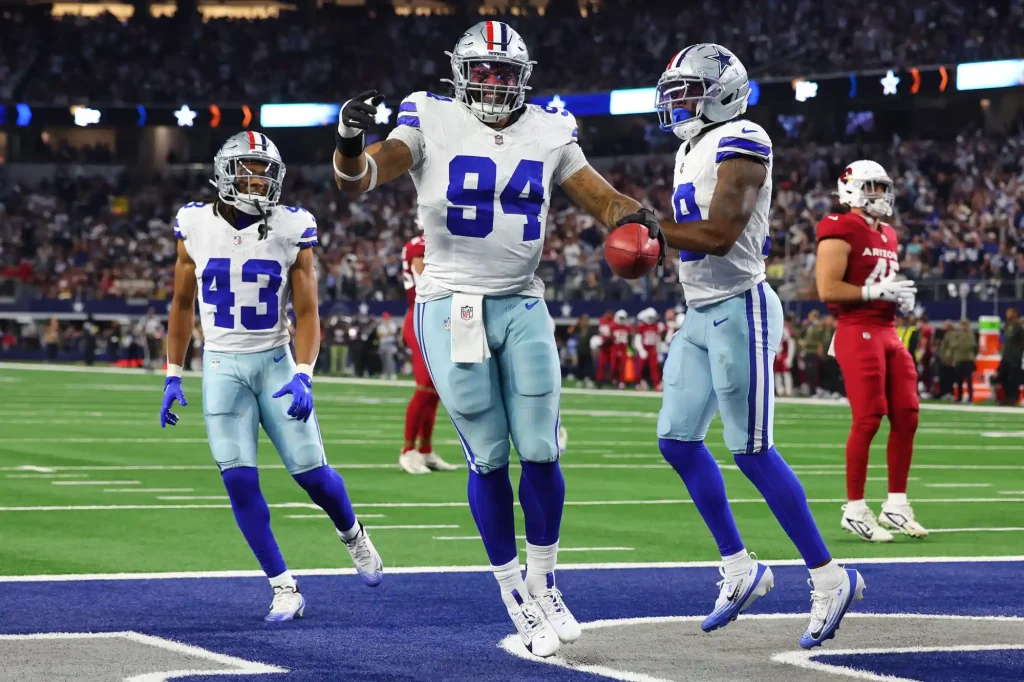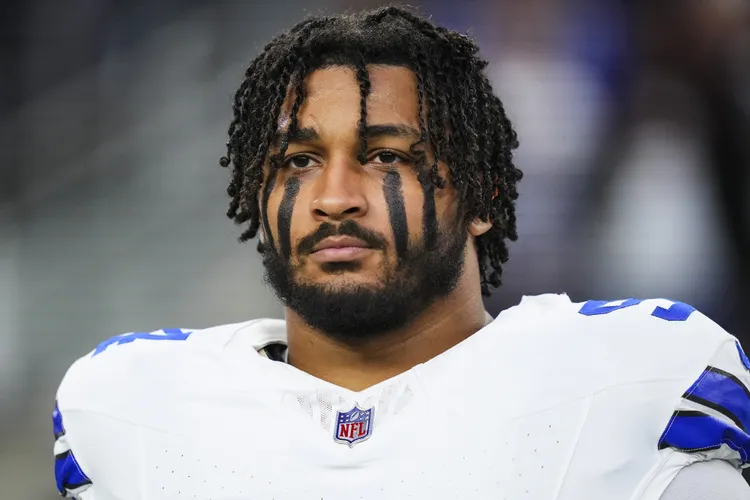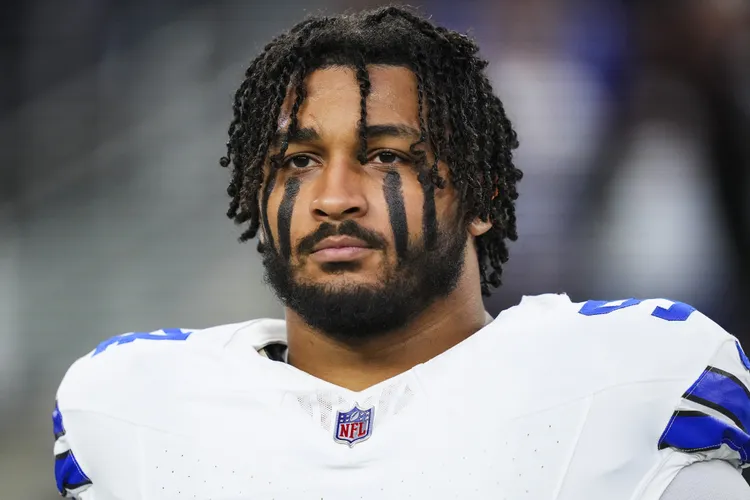24-Year-Old NFL Star Sends One-Word “Goodbye” Text to Loved Ones Before Police Chase and Apparent Suicide
The bustling lights of NFL competition have dimmed for one promising young star, leaving behind a wake of heartbreak, unanswered questions, and a glaring spotlight on mental-health fragility in professional sports. On the night of Wednesday, November 5, 2025, Marshawn Kneeland — a 24-year-old defensive end for the Dallas Cowboys — sent a group text to his family that simply said “goodbye,” according to police dispatch audio reviewed by authorities. A few hours later, after fleeing a traffic stop and subsequent vehicle crash near Dallas, he was found dead from an apparent self-inflicted gunshot wound.

Kneeland’s death pierces through the triumph of youth and athletic promise, reminding us that personal struggle does not respect success or public visibility. His journey from college standout to professional athlete in the NFL was marked by determination and the kind of hope that fuels so many young players’ dreams. He was drafted in the second round of the 2024 NFL Draft, the 56th overall selection out of Western Michigan, and had not only made his way to the NFL but had just days earlier celebrated a milestone — his first career touchdown.
Yet in the hours after that triumph, a series of chilling events unfolded. According to Texas law-enforcement reports, Kneeland did not stop for a traffic violation when flagged by troopers of the Texas Department of Public Safety, prompting a vehicle pursuit that entered the city of Frisco, near Dallas, late Wednesday night. The chase ended when the vehicle was found crashed in the southbound lanes of the Dallas Parkway near Warren Parkway, just minutes away from the Cowboys’ headquarters. Kneeland fled on foot, prompting a search involving K-9 units and drones.
While officers were still tracking his movements, dispatch records reveal that his girlfriend, identified as Catalina, contacted authorities to say Kneeland was armed, had a history of mental-health issues, and had expressed an intent to “end it all.” A dispatcher recorded her words, warning that he was in crisis. Around 11:40 p.m., police made a welfare check at Kneeland’s residence in Plano, Texas, but found no one. The most haunting moment came soon after, when family members say they received a group text from Kneeland that simply read “goodbye.” In the recording, a dispatcher noted, “They’re concerned for his welfare.”
At approximately 1:30 a.m. on Thursday, Kneeland’s body was found inside a portable toilet near the crash site. Investigators determined the fatal wound was likely self-inflicted. The Dallas Cowboys confirmed his death in a statement that read: “It is with extreme sadness that the Dallas Cowboys share that Marshawn Kneeland tragically passed away this morning. Marshawn was a beloved teammate and member of our organization. Our thoughts and prayers are with his girlfriend Catalina and his family.”

What makes this tragedy even more painful is how quickly it followed a moment of joy. Kneeland’s rise in the league was steady and promising. Despite injuries during his rookie season, he had begun finding his rhythm in 2025. He had recorded multiple tackles, a sack, and had just scored his first touchdown — a rare highlight for a defensive lineman. Those close to him described him as quiet, humble, and deeply focused on making his late mother proud.
That loss — the death of his mother, Wendy Kneeland, in early 2024 — was one of the heaviest emotional blows of his young life. Just months before the NFL Draft, he spoke about her death, saying, “It was definitely tough. I always had the dream. I always told her, ‘I’m going to the NFL,’ and I made it.” He carried her ashes in a necklace, keeping her memory close even during games. Teammates often said that family was everything to him — and that his mother’s absence lingered quietly behind his eyes.
After news of his death broke, tributes poured in from across the league. Quarterback Dak Prescott, who lost his own brother to suicide, was visibly emotional when asked about Kneeland: “I hurt for his family,” he said softly. Defensive end Solomon Thomas, who has spoken publicly about suicide prevention after losing his sister in 2018, posted: “Brother Marshawn, I love you. I wish you knew it was going to be okay. I wish you knew the pain wouldn’t last and how loved you are.”
Friends from college remembered him as gentle and grounded, often staying behind after practice to mentor younger players. His former Western Michigan coach described him as “one of the most disciplined and sincere athletes” he’d ever coached — a young man who “never let success get to his head.”
But the tragedy also reopens an urgent conversation about mental-health care in professional sports. Despite the increasing number of resources offered by the NFL and the NFL Players Association, many athletes still battle silently under the weight of expectation, isolation, and pressure. Mental-health experts have long pointed out that the combination of constant performance scrutiny, physical pain, public attention, and personal loss can lead to emotional exhaustion that’s hard to detect until it’s too late.
In Kneeland’s case, the signs — while scattered — were there. He had spoken to close friends about feeling overwhelmed. He had recently gone quiet on social media. Those around him now wonder whether more could have been done, whether someone might have reached him before that text went out.
The dispatch audio paints a heartbreaking picture of a crisis unfolding in real time — a young man driving fast into the night, his family messaging, police trying to locate him, a girlfriend begging for help, and a team that would wake up to news that felt impossible to believe. The shock within the Cowboys’ organization has been described as “total devastation.” For players who saw him just hours earlier at practice, it feels surreal.
Mental-health advocates have used this moment to call for more proactive, personalized support systems within professional teams — not only for those already seeking therapy but for everyone on the roster. The goal, they say, is to make mental-wellness check-ins as routine as injury assessments.
Kneeland’s story is a haunting reminder that success and struggle can coexist. To fans, he was a rising NFL player — strong, fearless, and on his way to a long career. But behind the helmet was a young man still processing grief, pressure, and the weight of expectation. For his family, the pain now lives where pride once did.
The hope, among teammates and fans alike, is that his death will not fade into another headline, but serve as a catalyst for lasting change — that sports organizations, colleges, and communities will see the warning signs earlier, act faster, and treat emotional pain with the same urgency as physical injury.
Marshawn Kneeland’s story shouldn’t be remembered only for its end. It should be remembered for his perseverance — the kid from Grand Rapids who dreamed of playing under the stadium lights, who made it to the league, who played with passion, and who carried his mother’s memory every step of the way.
He was a son, a teammate, and a friend who made people smile — and whose final message, short as it was, will echo as a plea for compassion and awareness.
If you or someone you know is in crisis, help is available 24/7. In the U.S., you can call or text 988 to reach the Suicide and Crisis Lifeline.


